In this heartfelt and candid series, Partners—in Business and Bed, couples discuss the good, the bad, and the ugly of living and working together.
For close to two decades, Arounna Khounnoraj and John Booth have been operating Bookhou, an online and physical shop selling handmade homegoods and functional bags. Their photogenic store in downtown Toronto is also their studio and home, making it a modern day mom and pop shop. These successful artists are also life partners who are parents to two kids while living and working with Arounna’s mother. Arounna and John share how they make the seemingly impossible work for them.
How did you two meet?
Arounna: John and I met at work at the Art Gallery of Ontario. We were working in the same department.
How and when did you realize this person could be your business partner and also your life partner?
Arounna: It’s funny. We were always friends, but then one day he brought in a portfolio of some furniture that he made and I really liked it. We had this idea that we would do a business together before we even became a couple because we both respected what each other did.
John: Funny how we remember things differently. I don’t know if I thought of it as a business decision more than just simply that we were immersed in things that we did. I think the business side came afterwards when we realized that we could do what we do and also contribute to each other’s work. We were both living as artists at the time, what we made weren't so much what I would call products, but they later became products.
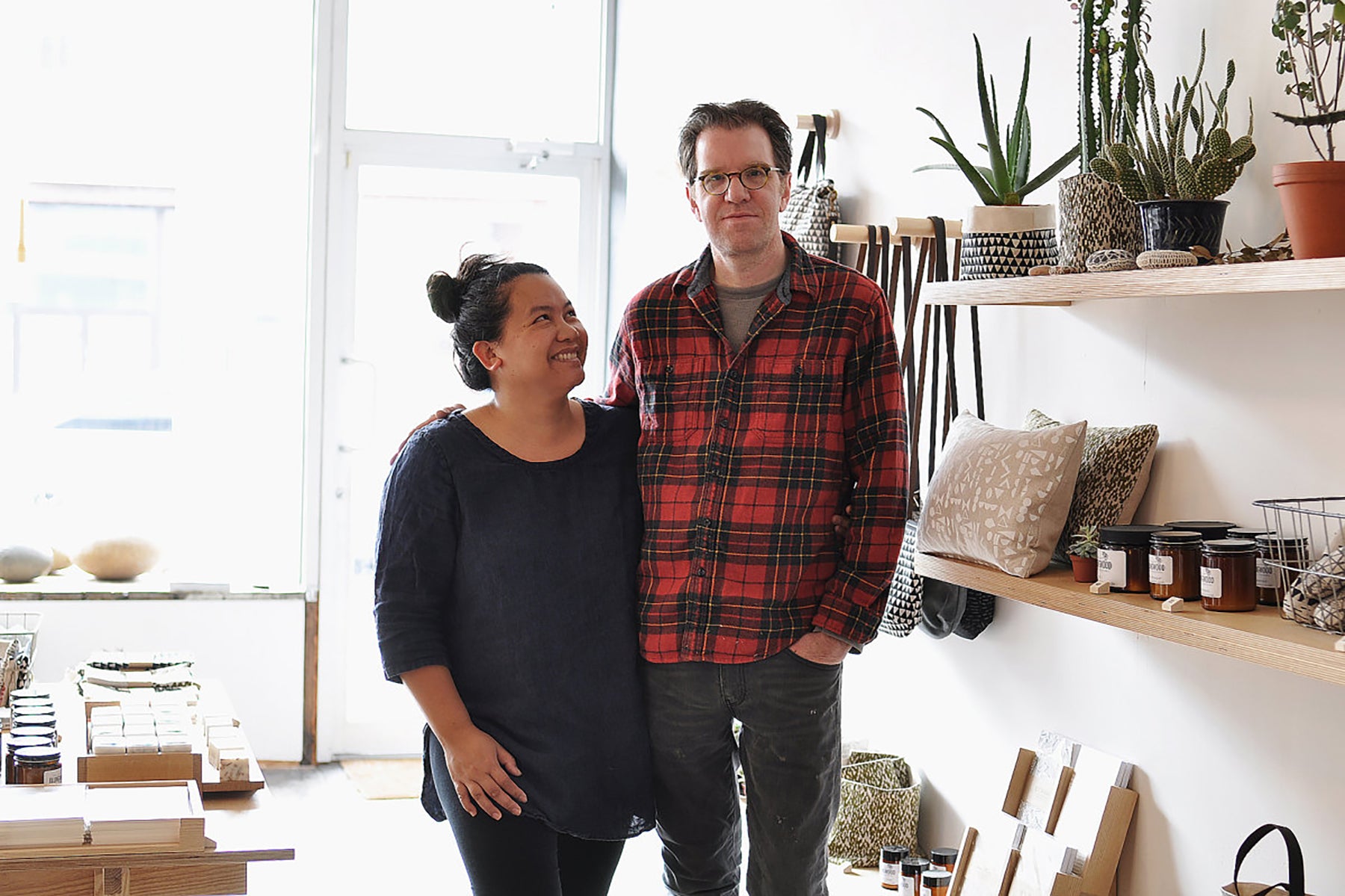
People feel like business and romance shouldn't mix together, how do you approach the two aspects and mix them together?
Arounna: What’s good about working with John is that we have full trust in what we are doing and our decisions. We see each other every day, all the time, and I feel like we've done that from the start.
We work in this building, but we’re not always in the same room together so it’s not like we’re always face-to-face. We’re always busy working on different things.
John: I have my projects and I make the decisions about them, and Arounna has her directions as well. There’s a lot of commonality when we work on Bookhou, but we also have our world that we can retreat to and work out our own ideas without thinking that it’s just ours. I think that balance really helps.
It’s not all the pressure of work all the time. We’ve built a studio where we can do a lot of different things in a lot of different places. So there’s not so much pressure to always be business all the time—we can escape and do other things as well, which I think helps.
What were your thoughts about people who are life and business partners before you started to work together? Has it changed over the years?
John: It became very clear to me at the beginning when we started going out and then we moved in together that Arounna is someone who really likes to keep busy. We’ll be hanging out at home and she’ll be working in bed. That’s really one of the great things about her. There was always creativity. Downtime would be going to eat. But it was what we enjoyed so much that it was difficult to separate between personal time and so-called work time.
That’s kind of the way it always has been. It’s just that we’ve become more functionally successful and there’s kids in there. So it’s more complicated now, but it still seems to work. I think the teamwork allows us to keep busy all the time. If she’s busy doing something, I’ll run up and deal with things and feed the kids. It always seems to work somehow.
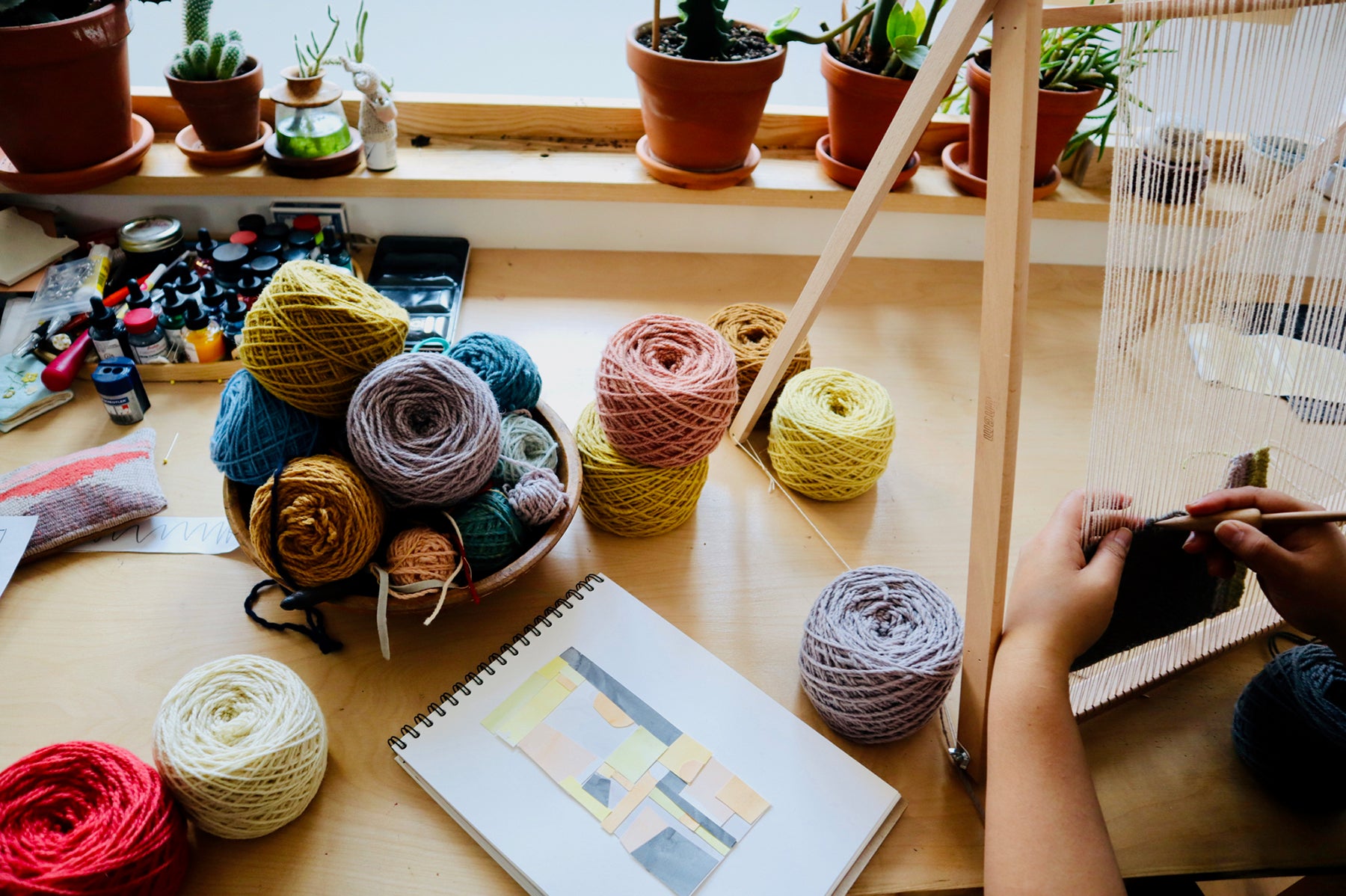
Have friends or family been shocked that you work so well together in all aspects?
John: I’m not sure about friends or family, but I am amazed that two people who just make things with their hands can make a living, and I give a lot of that credit to Arounna. She’s so good at figuring out the business side, whereas I’m happier in the studio making experiments. I can’t take any credit for turning this into a successful company. I’m good at being more the critical guy in behind the scenes.
Arounna. There’s definitely a good balance. John deals with the financial part of the business and I deal with more the marketing and the creative side. I think that having those two skills is good to feed off of each other and I think that’s why it works so well. There’s no power struggle of who’s doing what. We know what our jobs are and we just go and do it.
John: It’s not a job description like you would have at work. When she asks me a question, for instance, what’s my opinion about this or can I help out on this, I already know what she needs as a person and as an artist. It really helps, being partners, because the difficulties of being creatives get softened when we know each other and we know what each other needs.
Have there been difficult situations that you have run into in the past, either personally or professionally, and how did you overcome them together?
John: The difficulty of our business is in social media. There are things you have to deal with around copying and they become very stressful. My approach to life is maybe a little bit different than hers, so I try to coax her. I think it just takes time. Nothing ever happens immediately, so you have to be patient. Dealing with each other takes time. When you put your work out in public and it’s received well or it’s stolen—you have to get used to it. Over time, you do, but at first, it’s kind of disappointing and tricky. So you have to support each other.
Arounna: I think, for us, it’s really hard sometimes because the job and the life blur into one. We always talk about work or the kids, but we’ve made time to take days off or have meetings outside of the studio or go on trips, and that helps to balance the work-life relationship.
John: You have to accept each other’s opinions. Even if it’s frustrating sometimes, you have to learn to accept it. Growth is really hard when you’re working from an artist’s studio and then, all of a sudden, you have all this success.
Arounna: Yes and that’s our biggest struggle right now is dealing with demand and trying to get more work done by other people. That way we can have more of a life.
At home do you divvy up responsibilities or do you just pitch in whenever you see fit?
John: No, there’s some pretty rigid roles. Arounna takes on such a huge role and she’s probably downstairs working while I'm upstairs cooking, which is a good thing because, sorry, honey, I’m a better cook.
So if I'm going to cook, I might as well shop, but we also have her mother here. Her mother works with us and she is very kind in picking up the kids quite often at school. So there’s a lot of teamwork. We do take time off with the kids, watching movies and stuff. Because we work and live in the studio, we can flip back and forth really easily.
Arounna: That's pretty fair. John definitely does a lot more of the domestic stuff because he’s just better at it than I am. That’s how he keeps us afloat, keeps us fed and alive, which is very important.
What’s one of your biggest victories or successful moments and how did you celebrate?
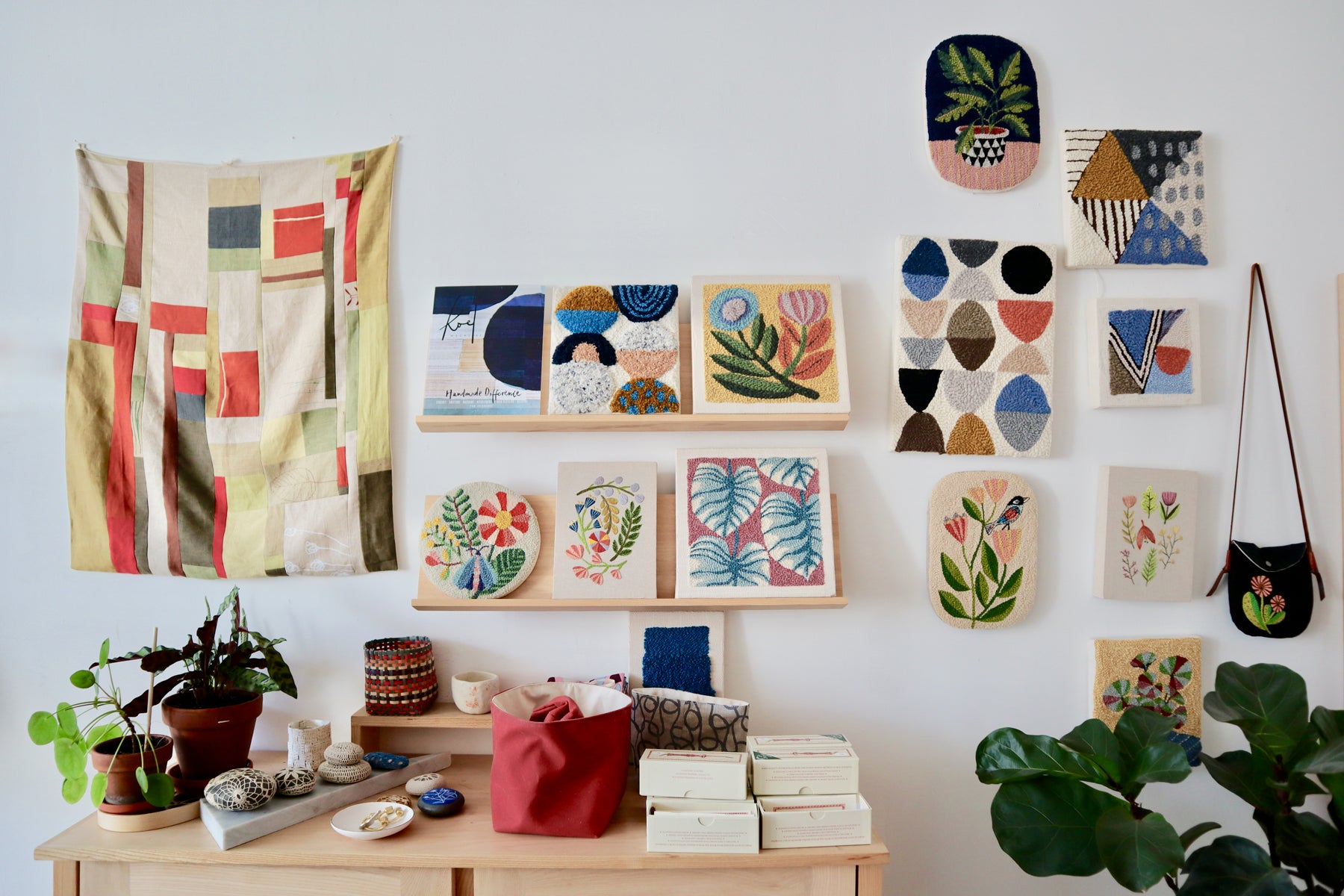
Arounna: I think just being able to make a living selling handmade goods. I think that’s a huge victory. In a world where you have so much competition and your competition is a lot of mass-produced items, the fact that people are spending more money on something that they could probably get cheaper at another store, I think that’s a huge success. I don’t think a lot of people can do that and I think that us being able to do this for 17 years, it’s a huge deal.
John: I guess one of the victories was we quit our jobs. I mean, that’s a victory for any artist, right? Get rid of your job so you can do this full-time.
Arounna: Yes, our daughter, Piper, was born and we just decided it’s now or never. When you quit your full-time job, you work harder toward the business because it’s all you’ve got, whereas when you work at it part time, you’re spreading yourself thin. So we didn’t have a formal celebration, but we probably did in our mind.
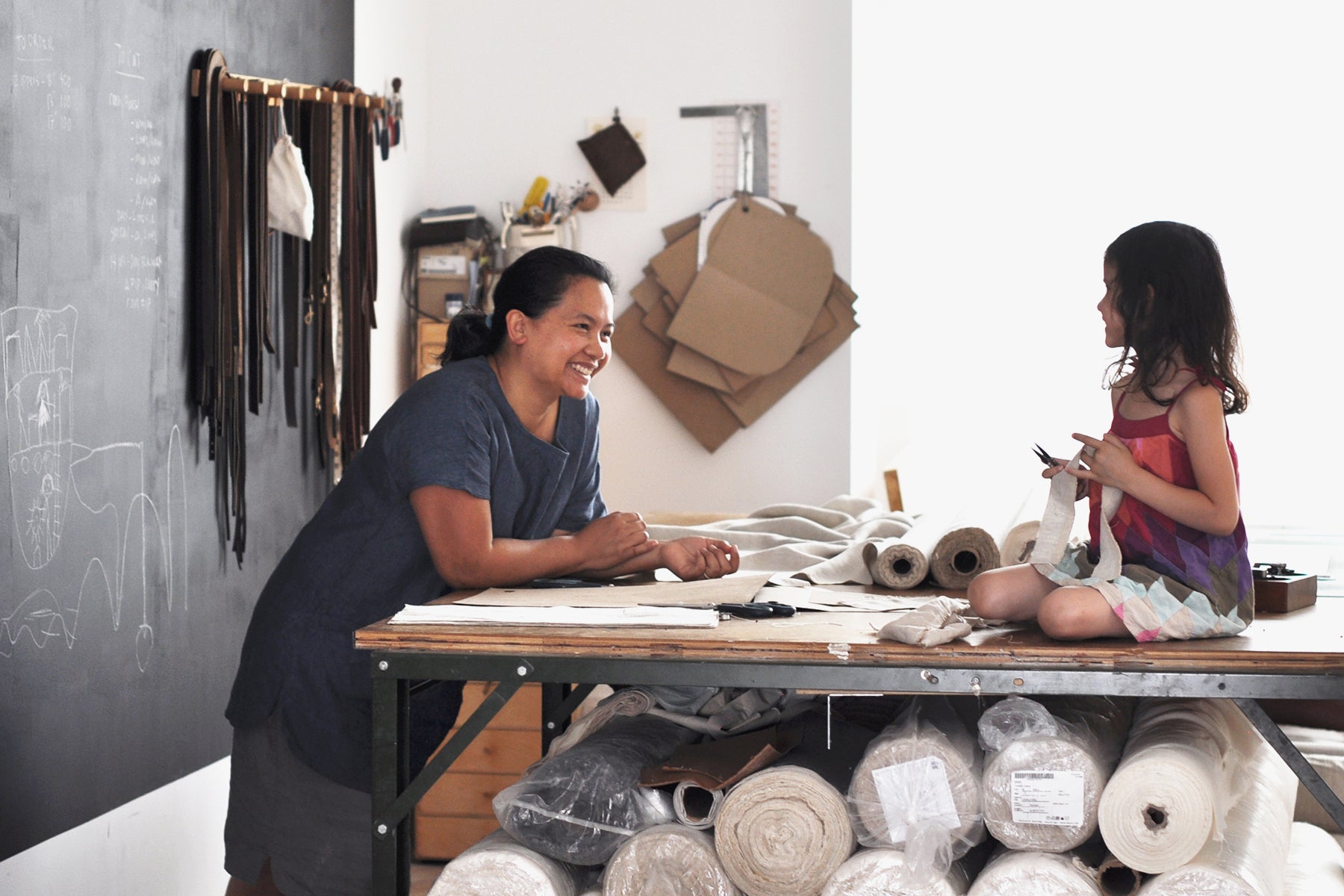
When conflicts do arise in business versus home, are there different approaches you take to resolve them or do you feel like there are parallels in how you resolve disagreements?
Arounna: I think there’s definitely parallels since they’re so closely connected. I think we don’t really have conflicts on the business side. A lot of our customers are online, and so there’s always the basic things of dealing with what they’ve ordered and then working with suppliers.
In our life conflicts, I don’t think that any of them are so detrimental that they require a lot of problem-solving. Usually, it’s during the busier times—you’re more stressed and you might be a little bit snappier with each other, but the core of our relationship is always the same. But none of the conflicts are really difficult to resolve because of our foundation.
John: The foundation is that we both already agreed on how we want to live our lives, where this company should go, and how we can find freedom to do our own work on the side. Even when life gets really busy, you just have to prioritize. I think it really comes down to the fact that we agree on life direction. So there's never been a conflict in that.
How do you feel about work-life balance and what does that mean to you?
Arounna: I don’t think we have a work-life balance. I come from a family of immigrants, and I feel like having that attitude of trying to find a balance in life is actually a luxurious thought process, because a lot of the time when my family first came to Canada and they were working so much, it was really about surviving.
We work and live in the same building and everything is sort of intertwined. I see the kids, they might not be doing exactly what I’m doing, but they’re around, and same with John. We’re always together in some way or another. We always have our meals together and we’re always chatting. I feel like we all coexist really well together and I don’t think that there is a work-life balance. I think it’s just all kind of connected together and we make it work. I don’t know how we make it work, but we do. How do you feel, John?
John: I think about a Venn diagram. You have a work circle and a life circle. For a lot of people, they’re separate, just to balance it. But, for us, they aren’t separate. They’re really sitting on top of each other. Life and work are so connected to each other because it’s what we enjoy. We’re both really inquisitive people. I like doing experiments. Doesn’t matter what it leads to, and sometimes, they lead to something really amazing and sometimes not, but we just enjoy being busy.
That doesn’t mean we don’t need down time. I go out, and I shop, and whatever. I water the plants and hang out with the kids, but I never really leave the ideas that are kicking around in my head that have to do with studio work or creativity. So the word “balance” for us is kind of a tricky term because we’re not really balancing separate things, if you know what I mean.
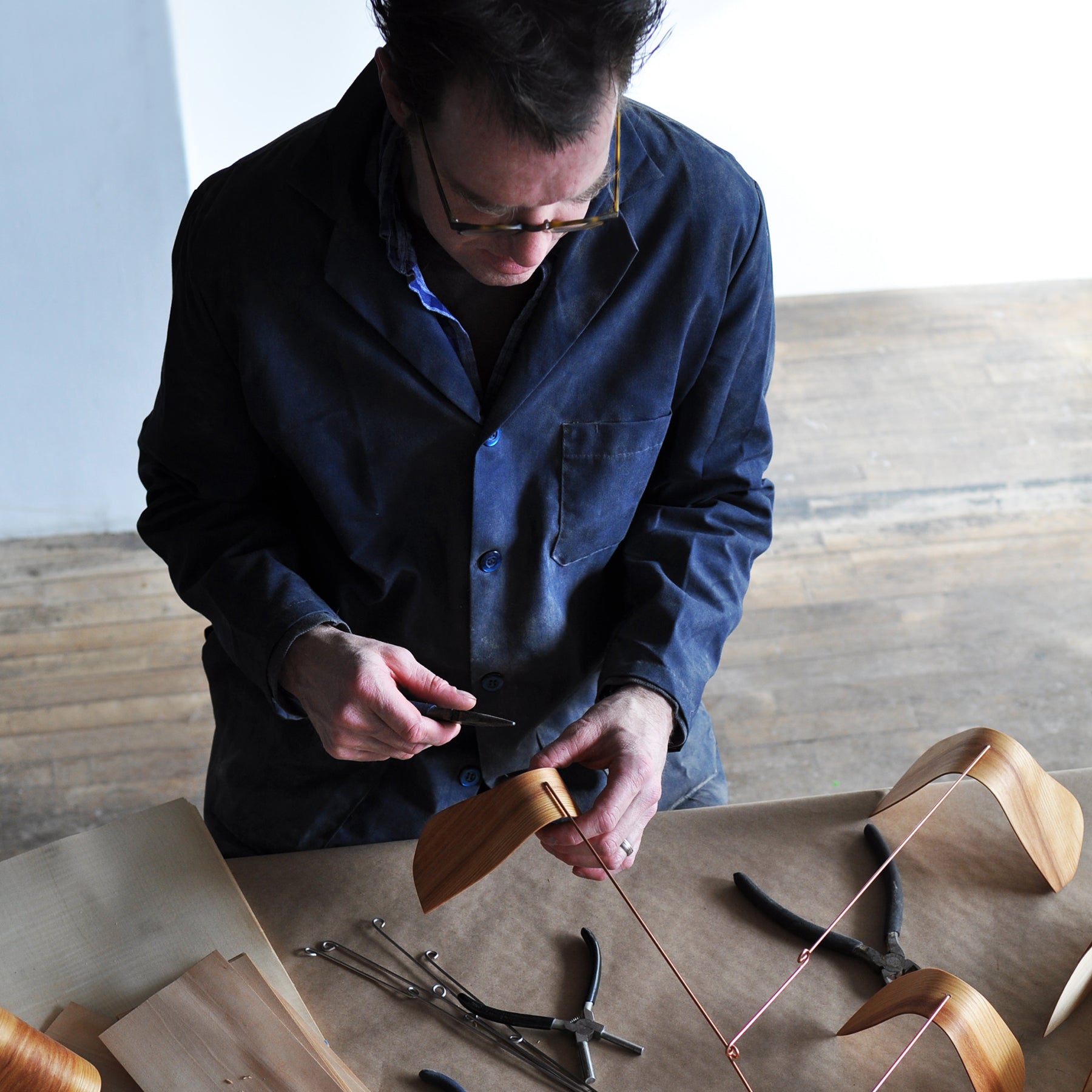
Have you set any goals together, either in terms of business or personally, that you want to accomplish?
John: I think we’d like to travel some more. We’re traveling for work, mostly due to Arounna’s new book and the workshops she does. But I think we’d like to see a few more things in the world, and it’s also good for the kids.
Arounna: I really wanted to go was Australia, so we’re going there at the end of the year for my book tour. So that’s pretty exciting, but I think I’d like to take the kids to Europe. I’ve been to Europe when I was a teenager, but I’d like to go back. And places in Asia, like Korea and China.
The goal of our business is that we’re trying to focus more on getting help with production so that we’re not physically making everything all the time, because it’s physically demanding.
What is a typical date night?
Arounna: Well, our date nights involve our children since they’re always with us, but when we do get to go out without them, it’s usually to a nice place for dinner, and then we just walk around the neighborhood or sit in the park.
We really like going out to eat because, since John does most of the cooking, it gives him a break. Then we always try to eat at places with food that he doesn’t normally cook. Or just going somewhere and having a coffee, chatting, and not being in the studio. But we always joke that when we go to the cottage, the one thing we want to do is sleep. That’s usually an ideal break for us. The kids are swimming and we’re sleeping.
What is your dream date night?
Arounna: I think going to a concert. John and I both like music, so we actually did that a lot before we had kids. So I think to go to one of those festivals, I don’t want to say Coachella because that’s really young, but something like that. Where you go and there’s a couple days of concerts and just hanging out. Somewhere in Joshua Tree. I don’t know why I think Joshua Tree, but that’s a place I’d really like to visit.
John: Can it be more than just a night? She’s right about music. The people I used to see are getting old. I think Bob Dylan has a heater onstage. But it would be amazing to go somewhere and see some music and eat.
Illustration by Shout